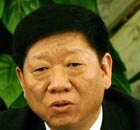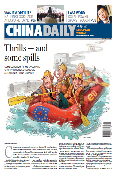More concerns than cheers
Updated: 2010-08-10 07:57
By Yi Xianrong (China Daily)
The largest developing nation must make more efforts to boost its low per capita GDP and economic quality
The fact that China is overtaking Japan to become the second largest economy in the world is not a matter of exultation given that the country still has miles to go before it can become a real economic power
Yi Gang, deputy governor of the People's Bank of China, the nation's central bank, noted recently that China has been surpassing Japan as the world's second largest economy.
His remarks coincided with a British newspaper report, which pointed out that the nation would top the United States in the next nine years if Beijing manages to retain its current high growth rate.
Yi's comment has led to a flurry of media reports at home and abroad although some in the media have called into question China's gross domestic product (GDP) number. They have urged for caution, asking people not to take the development seriously.
At the same time, there are also others who believe that it is just a matter of time before the nation becomes the numero uno economy, chiefly on the back of its blistering rate of growth over the past three decades.
In fact, it is unimportant at the moment whether China has become the world's second largest economy or if it will surpass the US in terms of economic output within the next nine years.
Considering its double-digit yearly rate of growth over the past three decades and its prevailing currency exchange rate, China's economic heft is an indisputable fact. We should not excessively brood over the accuracy of the country's GDP data.
Despite its enormous economic aggregate, China's per capita GDP still lags that of the US and European counterparts.
Its $3,800 per capita GDP accounts for less than one-tenth that of Japan and just one-sixth of France's.
Besides its low per capita economic output, which is less than that of other mid-level developing countries, China's economic growth quality also cannot be compared to that of the US or other developed nations.
Since 2003, China's fast economic expansion has been largely based on exports and a booming real estate industry. Mushrooming exports in the past decades have not only helped integrate the country into the international market, but have also beefed up its economic quality.
However, the unbridled development of the country's real estate market over the past years - which is mainly based on extensive exploitation of limited land resources, excessive investment, speculation and rocketing housing prices - has led to bubbles in the sector and introduced serious uncertainty into whether the nation can show sustainable, stable and healthy growth.
The housing market-dependent GDP growth model will negatively affect the country's economic progress unless substantial changes are made to this approach.
Paper's Digest

Chinese jet takes on Big 2
First large commercial plane set to ride on demand for aircraft as economy grows.
Super-CPU only for domestic eyes
Specials

Gaining ground
Doing business in china for westerners has come a long way, Peter batey says.

Safeguarding environment a priority
China continues to face mounting pressure to curb environmental degradation, despite progress in reducing pollution over the last five years, the environmental protection minister warned.

Employment to remain a continuing challenge
China's top labor official said the country will face a tough employment situation in the next five years.
